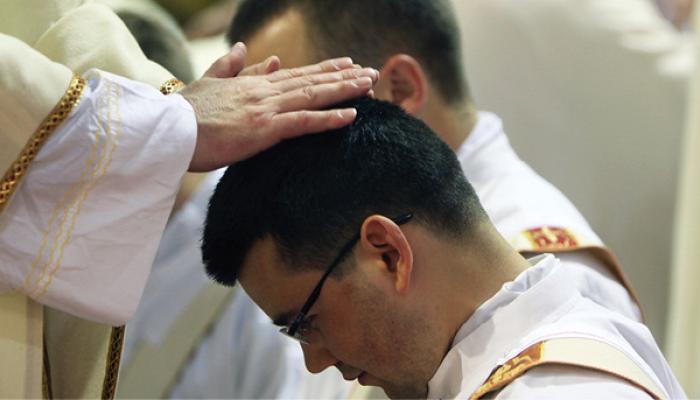
3.38 Why confess to a priest, instead of just to God?
With all his heart, Jesus wants to forgive people their sins. This is the ultimate reason why he died on the cross! To forgive sins, Jesus instituted the sacrament of reconciliation, also known as confession.
The Apostles and their successors (bishops and priests) were instructed to forgive people their sins on behalf of God (Jn. 20:21-23) Jn. 20:21-23: Again Jesus said, “Peace be with you! As the Father has sent me, I am sending you.” And with that he breathed on them and said, “Receive the Holy Spirit. If you forgive anyone his sins, they are forgiven; if you do not forgive them, they are not forgiven.”. When a priest absolves you of your sins (absolution), you are truly forgiven by God. So there is no reason to doubt whether your sins have been forgiven. In the #TwGOD app you can find the words of absolution in many languages.
Why is there a sacrament of Reconciliation after Baptism?
Since the new life of grace received in Baptism does not abolish the weakness of human nature nor the inclination to sin (that is, concupiscence), Christ instituted this sacrament for the conversion of the baptized who have been separated from him by sin. [CCCC 297]
Who is the minister of this sacrament?
Christ has entrusted the ministry of Reconciliation to his apostles, to the bishops who are their successors and to the priests who are the collaborators of the bishops, all of whom become thereby instruments of the mercy and justice of God. They exercise their power of forgiving sins in the name of the Father and of the Son and of the Holy Spirit. [CCCC 307]
What names are there for the sacrament of Penance?
The sacrament of Penance is also called the sacrament of Reconciliation, of forgiveness, of conversion, or of confession. [Youcat 225]
But we have Baptism, which reconciles us with God; why then do we need a special sacrament of Reconciliation?
Baptism does snatch us from the power of sin and death and brings us into the new life of the children of God, but it does not free us from human weakness and the inclination to sin. That is why we need a place where we can be reconciled with God again and again. That place is confession.
It does not seem like a modern thing to go to confession; it can be difficult and may cost a great deal of effort at first. But it is one of the greatest graces that we can receive again and again in our life—it truly renews the soul, completely unburdens it, leaving it without the debts of the past, accepted in love, and equipped with new strength. God is merciful, and he desires nothing more earnestly than for us, too, to lay claim to his mercy. Someone who has gone to confession turns a clean, new page in the book of his life. [Youcat 226]
Who instituted the sacrament of Penance?
Jesus himself instituted the sacrament of Penance when he showed himself to his apostles on Easter day and commanded them, “Receive the Holy Spirit. If you forgive the sins of any, they are forgiven; if you retain the sins of any, they are retained” (Jn 20:22a–23).
Nowhere did Jesus express more beautifully what happens in the sacrament of Penance than in the parable of the Prodigal son: We go astray, we are lost and can no longer hope. Yet our Father waits for us with great, indeed, infinite longing; he forgives us when we come back; he takes us in again, forgives our sins. Jesus himself forgave the sins of many individuals; it was more important to him than working miracles. He regarded this as the great sign of the dawning of the kingdom of God, in which all wounds are healed and all tears are wiped away. Jesus forgave sins in the power of the Holy Spirit, and he handed that power on to his apostles. We fall into the arms of our heavenly Father when we go to a priest and confess. [Youcat 227]
Who can forgive sins?
God alone can forgive sins. Jesus could say “Your sins are forgiven” (Mk 2:5) only because he is the Son of God. And priests can forgive sins in Jesus’ place only because Jesus has given them that authority.
Many people say, “I can go directly to God; why do I need a priest?” God, though, wants it otherwise. We rationalize our sins away and like to sweep things under the rug. That is why God wants us to tell our sins and to acknowledge them in a personal encounter. Therefore, the following words from the Gospel are true of priests: “If you forgive the sins of any, they are forgiven; if you retain the sins of any, they are retained” (Jn 20:23). [Youcat 228]
What sins must be confessed?
Under normal circumstances, all serious sins that one remembers after making a thorough examination of conscience and that have not yet been confessed can be forgiven only in individual sacramental confession.
Of course there will be reluctance before making a confession. Overcoming it is the first step toward interior healing. Often it helps to think that even the Pope has to have the courage to confess his failings and weaknesses to another priest—and thereby to God. Only in life-or-death emergencies (for instance, during an airstrike in wartime or on other occasions when a group of people are in danger of death) can a priest administer “general absolution” to a group of people without the personal confession of sins beforehand. However, afterwards, one must confess serious sins in a personal confession at the first opportunity. [Youcat 233]
Can I make a confession even if I have not committed any serious sins?
Confession is a great gift of healing that brings about closer union with the Lord, even if, strictly speaking, you do not have to go to confession.
In Taizé, at Catholic conferences, at World Youth Day celebrations – everywhere, you see young people being reconciled with God. Christians who take seriously their decision to follow Jesus seek the joy that comes from a radical new beginning with God. Even the saints went to confession regularly, if possible. They needed it in order to grow in humility and charity, so as to allow themselves to be touched by God’s healing light even in the inmost recesses of their souls. [Youcat 235]
May a priest later repeat something he has learned in confession?
No. Under no circumstances. The secrecy of the confessional is absolute. Any priest who would tell another person something he had learned in the confessional would be excommunicated. Even to the police, the priest cannot say or suggest anything.
There is hardly anything that priests take more seriously than the seal of the confessional. There are priests who have suffered torture for it and have gone to their deaths. Therefore, you can speak candidly and unreservedly to a priest and confide in him with great peace of mind, because his only job at that moment is to be entirely “the ear of God”. [Youcat 238]
See that sins are forgiven through the Holy Spirit. But men make use of their ministry for the forgiveness of sins, they do not exercise the right of any power of their own. For they forgive sins not in their own name but in that of the Father and of the Son and of the Holy Spirit. They ask, the Godhead gives, the service is of man, the gift is of the Power on high. [St. Ambrose, On the Holy Spirit, Bk. 3, Chap. 18 (ML 16, 808)]
Let no one either by sins or by years be retarded from coming to the acquiring of salvation. To him who still remains in this world no repentance is too late. The approach to God's forgiveness is open, and for those who seek and understand the truth the access is easy... Pardon is granted to him who confesses, and to him who believes saving forgiveness is conceded out of God's goodness. [St. Cyprian, To Demetrian, Chap. 25 (ML 4, 563)]





